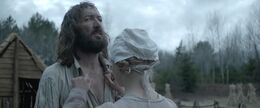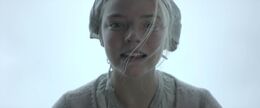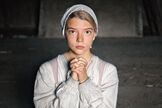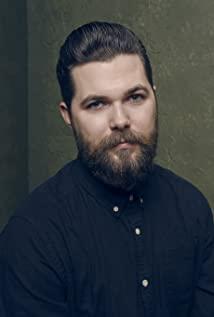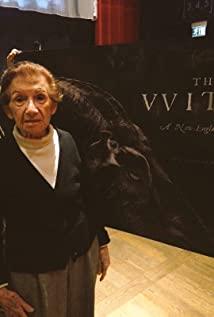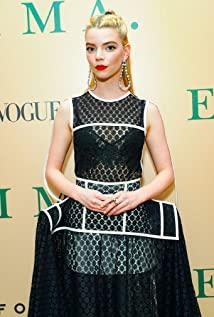A double-bill of American auteur-on-the-rising Robert Eggers' two astounding feature films, THE WITCH and THE LIGHTHOUSE, both extract their sources from erstwhile folktales, the former is 17th century rural horror of witchery and satanism whereas the latter fast -forwards two centuries later, and tests a man's sanity in a pharological cul-de-sac.
In THE WITCH, Puritan New England settler, William (Ineson) locks horns with the local church on the religious front, and is banished from the plantation with his wife Katherine (Dickie) and their brood. Relocated near a mythical wood, the family starts their hand-to-mouth subsistence just fine, until their infant son is snatched by a witch under the care of their firstborn, the nubile Thomasin (Taylor-Joy), you are never too late to know an unbaptized baby is the key ingredient for a witch's flying ointment.
The family throws the family into a tailspin with further afflictions, Caleb (Scrimshaw, ), the second-born son, tragedy consumed by incestuous impulse, falls victim of a sylvan siren call, and the two twins Mercy and Jonas (Grainger and Dawson respectively) , peskily pit against an already guilt-driven Thomasin and it seems that the family's black billy goat might be the culprit answerable for their wayward behavior, the twins claim Thomasin is a witch, to whom they impute the two-fold demises of their siblings.
In the thick of its blame-throwing, hallucination-effecting, sin-confessing chaos, all hell breaks loose with predictable outcomes, sinners must pay for their sins, whether it is pride or wrath, and Thomasin, ever elfin and dainty as a wide -eyed hare, eventually confirms our trepidation when she signs a book with the devil and eventually relishes in a witches' sabbath. Anya Taylor-Joy is a revelation who abandons herself to the rawest emotional states, while the close-knit cast is overall impressive , Ralph Ineson is alternatively sympathetic and antipathetic (when the Electra complex gives way to entrenched oscillation) as the beleaguered breadwinner, a gaunt-looking Kate Dickie stands out from the crowd as a tremendous force of grief, ire and desolation, by the same token ,Child actor Harvey Scrimshaw might touch on overacting in his final emotive outpouring of demonic possession.
On top of Craig Lathrop's otherworldly production design that eerily summons the primordial mystery and terror in sublime nicety, DP Jarin Blaschke's terrific natural lightning (guttering candlelight mostly), plus a wailing, pulsating score by Mark Korven, it is Eggers' peculiar predisposition of animism and its mythological symbolism (the hare, the goat, also the gull in THE LIGHTHOUSE) that makes the strongest mark, THE WITCH disgorges a deferential awe to the mysticism and regards our human folly with a cold glare, dispensationalism is no cure for mankind's salvation .
THE LIGHTHOUSE - saturated with its vintage black-and-white cinematography within an almost four-square frame (1.19:1), is entirely another knockout of artistic magnitude from Eggers and co., Blaschke is meritoriously nominated for an Oscar for its retro- tinted visual astonishment - is literally a two-hander, between a senior lighthouse watcher Thomas Wake (Dafoe) and his newly hired assistant, whose appellation is Ephraim Winslow (Pattinson), who mostly travails in the spadework and is off limit to the lighthouse's lantern room, where luminous light emanates.
Secluded in the island off the coast of New England while combatting the elemental forces of extreme weather and sea waves, Ephraim's initial four-week stint predictably extends into more nights when they are on a bender, the two men's conflict escalates from striving for one- upmanship to murderous intention that certifies the proverb: give a man enough rope and he will hang himself. Here, what constitutes the rope is a high-handed father figure and a forbidden place.
Freudian drive also attributes to in Ephraim's marble-losing process - who later confesses that his real name is Thomas Howard, a lumberjack with a past of malice, a mermaid scrimshaw stimulates his self-abuse, a homoerotic embrace with Wake in the heat of their booze-addled revelry is cautiously cut short before their impulse of canoodling, and what is happening in the forbidden lantern room, the tip of the phallic building?
In Howard's own imagination, there must be an amatory being that keeps him spellbound and tantalizes him to the core, he will spare nothing to find out the answer, and the only obstacle is Wake, his namesake patriarchal superior who is only bearable when he gets blotto, a monomaniac Howard must turn the tables to attain his holy grail, which finally incurs a gory demise and a Promethean punishment that bespeaks of Eggers' disposition of myth-conjuring and psychosexual probing.
Auditory achievements, whether the echo chamber deployment of a bellowing foghorn, or Korven's cavernous, buzzing, rumbling accompaniment music, patently boosts THE LIGHTHOUSE's eerie, claustrophobic and paranoiac atmospherics. Lo and behold, a gammy Dafoe, effuses grandly in a rapt spell, pulling off bombastic monologue as if he is truly off his trolley and offering a definitive rendition of what is machismo in its most hardboiled, unrelenting form; Pattinson, on the other hand, fares extremely well against a hyperbolic Dafoe, and lets rip of his own demon with visceral expression, fuses together a complex of personae of a putdown, a malefactor and a rainbow-chaser, in his post-TWILIGHT orbit of career reinvention, Pattinson has triumphantly established him as a serious actor with pliable ranges, he earns the next Batman gig not for nothing!
referential entries: Ari Aster's HEREDITARY (2018, 7.6/10); Peter Strickland's KATALIN VARGA (2009, 7.2/10).
View more about The Witch reviews




